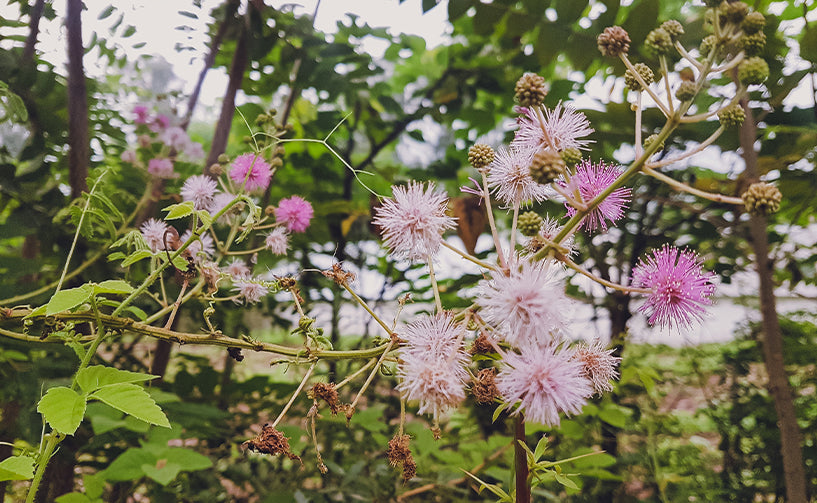Lajauni or Mimosa Pudica is also known as touch me not, action plant, humble plant, shame plant or sleepy plant. It belongs to the Fabaceae or the legume family. When touched or exposed to any external stimuli (blowing, warmth, shaking, touching), the leaves droop or fold inward to defend itself from any harm and reopen again after sometime. It shows a shrinking reaction when touched. Due to this fascinating phenomenon, it has gained popularity and various nicknames. It is well known for nyctinastic or periodic movement and the leaves re-open at night and close during the evening.
The herb is native to Central and South America and is extensively found across the globe. It is majorly found in Australia, U.S.A. and some Asian countries such as India, Bangladesh, Thailand, Japan, Sri Lanka and Indonesia. The plant is a creeper with bipinnately (divided twice) compound leaves, cylindrical stem and red flower petals with pink filaments. Its roots form nodules which help in the nitrogen fixation process.
Natural Constituents of Lajauni or Touch Me Not Plant
Some natural bio-chemicals found in the plant which are mainly responsible for its benefits are: alkaloids, sterols, glycosides, flavanoids, fatty acids and tannins. The seeds contain mucilage made up of D-xylose and D-glucuronic acid and the roots contain the main alkaloid, mimosine. This exhibits anti-bacterial, antioxidant, anti-proliferative properties and apoptotic effect.
Important Properties of Lajauni or Mimosa Pudica
It possesses anti-diuretic, anti-emetic, anti-bacterial, anti-asthmatic, anti-venom, anti-fertility, anti-convulsant, anti-depressant, aphrodisiac, anti-tumour, anti-diabetic, adaptogenic, anti-spasmodic anti- hepatotoxic, anti-oxidant, anti-viral, anti-fungal and nootropic action.
Benefits of Lajauni or Touch Me Not Plant
-
Kidney and Renal Health: Lajauni is an effective herb for the treatment of kidney stones, kidney pain and inflammation or nephritis. It induces urination and helps to expel out the stones through the urine.
-
Traditional Uses: The herb has been used traditionally in the treatment of kidney stones, urogenital disorders and pain, gynaecological disorders, bleeding piles, dysentery, diarrhoea, sinus, ulcers and wound healing.
- It has anti-hyperglycaemic and diuretic properties and helps in diabetes induced nephropathy.
- Used to treat urinary infections and inflammations.
- Roots can be used as a purgative or strong laxative.
- Helps in lumbago, glandular tumour and nodular tuberculosis.
- Widely used to manage bleeding piles, bleeding wounds, skin infections, sores and ulcers.
- Lajauni is a useful herb for snake bites and is an anti-poison.
- Helps in managing indigestion, asthma, and cough.
- Prevents several sleep disorders, since it is an adaptogen or calming herb.
- Prevents uterine bleeding.
- It can also be used in instances of low sperm count and impotency (male infertility disorders).
- It can be applied on glandular swelling and bone fractures as a poultice to reduce pain and swelling.
Lajauni leaves and its paste are mostly used to treat piles, urinary infections, fistula, sores, glandular swelling and sinus. The roots and its decoction are used to treat insect bite, insomnia, stomach worms, fever, dysentery, syphilis and other veneral ailments.
Lajauni or Mimosa Pudica and Safety: Lajauni is a safe herb to certain extend but avoid its use during constipation and scanty periods since it may have certain effects.






